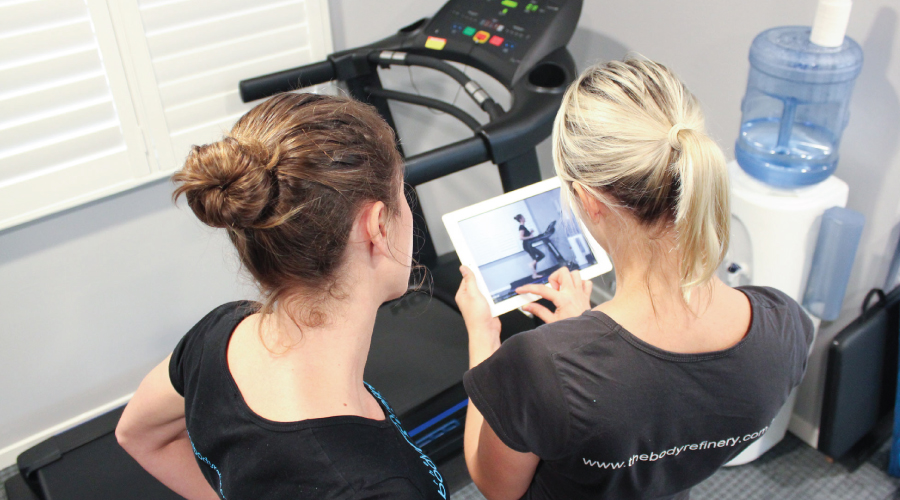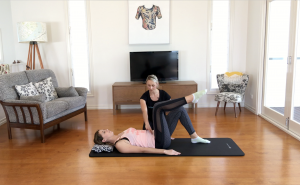I am postnatal and want to start running. How do I know if I am ready?
Running is a popular form of exercise for mums. You can do a quick 30-minute workout for free, work up a sweat and even take bub along once they are old enough. So it’s understandable that many new mums are keen to get back into running after having a baby.
However, because running is a high impact activity, there are some important things to consider first. When your foot hits the ground, there is a force called a “ground reaction force” that comes up through the lower limb, some of which is transmitted to the pelvic floor. In anticipation of this force, your pelvic floor will automatically activate just before your foot hits the ground to support your pelvic organs and prevent leaking.
Ground reaction forces are reported to be 1.6 and 2.5 times your body weight when running. In the postnatal period, your pelvic floor is weaker and slower to contract, making it less able to provide support and maintain continence while running. This means that if you return to running too soon before your body is ready, it can lead to pelvic floor issues such as prolapse and incontinence as well as musculoskeletal pain.
I have had my 6 weeks check-up with my GP / obstetrician, so doesn’t that mean I can start running?
No – and there are a couple of reasons for this.
- You should be at least 3 months postnatal before considering returning to running to allow enough time for the pelvic floor and abdominal muscles to heal.
- The 6-week postnatal checkup is only about 30 minutes long. In that time, your doctor has a lot to cover and often doesn’t have the time or the specialised training to clear you to return to running.
That is why it is recommended that, in addition to seeing your GP or obstetrician, you also see a women’s health physiotherapist who specialises in pelvic floor assessments.
I had a C-section, so shouldn’t my pelvic floor be fine if I return to running?
No – before the birth, your body doesn’t know that you are going to have a caesarean, so it will undergo many changes during pregnancy in preparation for birth. For example, there is a gap in your pelvic floor muscles known as the levator hiatus where the urethra, vagina and anal canal pass through. The levator hiatus area widens during pregnancy and takes 4-12 months postnatal to recover, rarely returning to its prenatal size. Although the levator hiatus doesn’t increase significantly as it does after vaginal birth, it will still be wider post caesarean than what it was before pregnancy. If you run with a wider levator hiatus, there is less support for the pelvic organs, predisposing to leaking and prolapse.
After a caesarean, there is also abdominal wound healing to consider. Studies have shown abdominal fascia has only regained 51%-59% of its strength by 6-weeks post caesarean section and 73%-93% of its strength at 6-7 months postnatal.
For these reasons, it is recommended you have an assessment with a women’s health physiotherapist if you wish to return to running, regardless of whether you had a vaginal or caesarean birth.
What is involved in a women’s health postnatal running assessment?
In the assessment, your women’s health physiotherapist will take a subjective history and identify any risk factors for returning to running. They will then perform an objective examination to check your abdominal function, lower limb strength and how your body copes with load and impact among other things. With your consent, they will also perform an internal examination to check your pelvic floor function and pelvic organ support.
Based on the assessment, your women’s health physiotherapist will prescribe an individualised exercise program to prepare you for running. This may involve exercises to strengthen your pelvic floor and lower limb muscles as well as re-training your pelvic floor to work reflexively like it does when running.
How long does it take to return to running?
Everybody is different. Some women are ready to return to running at 3 months postnatal, for others it may take up to a year before they are ready. Once you have been cleared to run, your women’s health physiotherapist will also be able to guide your return to running in a gradual way. This will reduce your risk of pelvic floor and musculoskeletal injury and ensure you get the best results from your running. Your women’s health physiotherapist can also recommend other forms of exercise that are best suited to your specific circumstances.
To book your postnatal running assessment with one of our women’s health physiotherapists please call 3358 3915 or visit our website.



